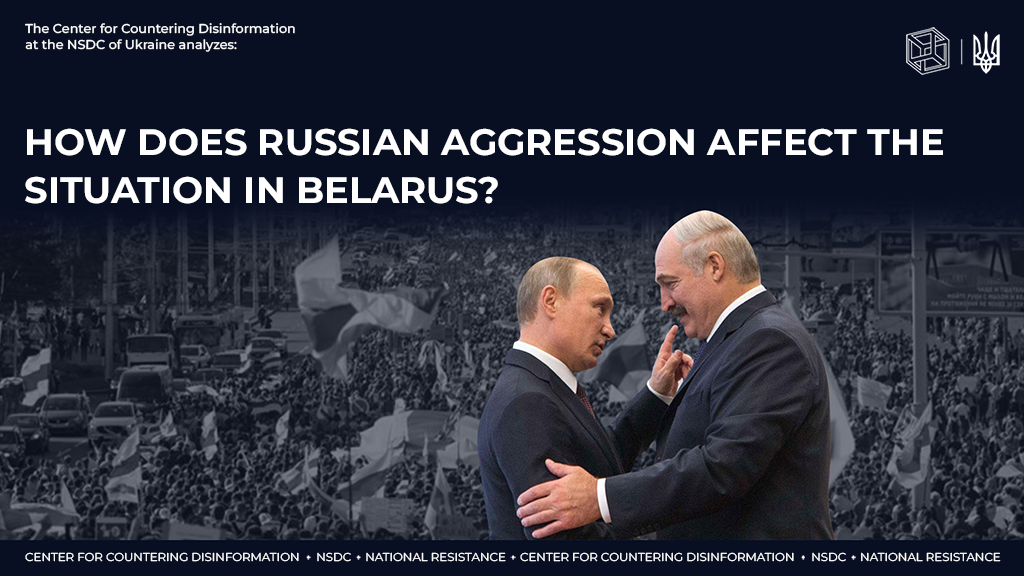Six months of war have had an impact on Belarusian-Ukrainian relations, as well as on the situation inside Belarus and the likelihood of Lukashenko leaving the political scene.
After the offensive of Russian troops into Ukraine, Lukashenko dragged his country into the war, turning Belarus into a bridgehead for the armed forces of the Russian Federation, thereby ultimately losing any opportunity for maneuvers in the international arena and destroying Belarusian-Ukrainian relations.
There are about 1,000 Russian military personnel on the territory of Belarus, 1 division of the Iskander missile complex, 3 S-300 and C-400 divisions are stationed, which carry out missile launches over Ukraine. That is, Belarus has become an accomplice to war crimes committed on the territory of Ukraine by the aggressor state and, in accordance with the requirements of international law, must bear responsibility, just like the Russian Federation.
However, as in previous years, Lukashenko is trying to preserve the possibility of renewing relations with the West and is demonstrating some elements of sovereignty and independence. Having put his country’s territory, airspace, and infrastructure at the service of Russia’s military needs, he never dared to introduce Belarusian troops into the territory of Ukraine, despite Putin’s pressure.
In fact, the main restraining factor for Lukashenka was the understanding that in such a case a large percentage of the Belarusian military would go over to the Ukrainian side. Nevertheless, the Kremlin is making a lot of efforts to help Lukashenka survive.
Putin believes that any new president of Belarus will be even worse for Moscow than the wayward Lukashenko. Considerable financial assistance, the landing of propagandists from Moscow to control the Belarusian airwaves, the deployment of Russian special services in the security forces of Belarus currently allow Lukashenka to remain in office. However, despite the fact that he physically held power in Belarus through repressive actions, he was unable to regain any international legitimacy, except for the Kremlin.
In response to Russia’s support, Western countries imposed harsh sanctions on Belarus, which hit all sectors of the economy hard. Thus, July inflation in the country reached more than 20%, while real incomes of Belarusians in January-June decreased by almost 3%.
In addition, brutal repression was able to some extent to overcome the protest movement inside Belarus. Many opponents of the government were forced to leave the country, where they continued active political activity or were imprisoned.
Under the new conditions, the Belarusian opposition decided to change the tactics of the fight against the Lukashenko regime. At the beginning of the war, massive street actions in support of Ukraine took place in Belarus; security forces detained more than a thousand people throughout the country. The so-called flight partisans, who are trying to slow down the advance of Russian troops to the Ukrainian border by detonating tracks, the “Belarusian Forest” information resource is constantly active, which informs in real time about the departures of military aircraft from the territory of Belarus and missile launches so that the Ukrainians can react in advance. On the side of Ukraine, two Belarusian regiments are fighting at the same time – named after Kastus Kalynovskyi and “Pagony”.
Due to its desire to hold on to power at all costs, the Lukashenko regime brutally suppressed a very peaceful uprising with the help of the police. Propagandists from the screens of Belarusian TV channels criticize the “collective West” for military aid to Ukraine and promote the narrative that the “Banderivites” plan to seize the Brest and Gomel regions.
But will he be able to continue to hold power?
The majority of experts came to a unanimous opinion that Lukashenka’s position regarding his continued stay in power after supporting Russian aggression has greatly weakened. After all, in the last two years, Lukashenka’s political stability was built on the financial and resource support of the Kremlin, which is currently in a critical state due to the war and sanctions. After the defeat in the war with Ukraine, Putin, in order to keep himself in the Kremlin, will be forced to “surrender” the Belarusian dictator as compensation for peace. Then it will depend only on the Belarusians themselves, whether Lukashenko will receive retribution with further sanctions, or whether he will sit on the dock as a war criminal.










